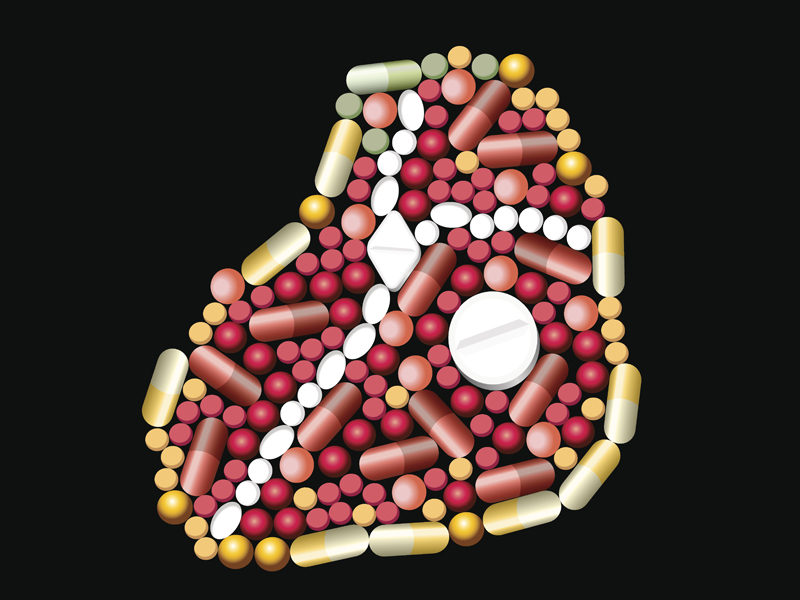Get Easy Health Digest™ in your inbox and don’t miss a thing when you subscribe today. Plus, get the free bonus report, Mother Nature’s Tips, Tricks and Remedies for Cholesterol, Blood Pressure & Blood Sugar as my way of saying welcome to the community!
Drugs that cause cancer and anemia found in our meat supply

Living in a polluted, chemical-filled environment is something we’ve almost become immune to.
Still, for your health’s sake, you might take steps to cut down on exposure by making careful choices.
But what about exposure to dangerous, even carcinogenic, drugs? No problem, as long as you’re not taking any, right?
Wrong. It turns out that every time you enjoy a burger, a juicy steak or even baked chicken you’re getting a side of drugs — banned drugs at that, including…
- Ketamine, a hallucinogenic “party drug”
- Phenylbutazone, an anti-inflammatory drug no longer used in humans because it causes aplastic anemia, a disease that makes your body stop producing new blood cells
- Chloramphenicol, a banned antibiotic that also causes aplastic anemia
- Nitroimidazoles, antifungal medications found to be carcinogenic
Drugs for dinner
How in the heck are these drugs are finding their way into your meat?
Apparently, no one knows for certain (clearly a big red flag waving over the agencies that should be protecting us), but contaminated feed and intentional misuse are near the top of the list.
But maybe an even bigger red flag is that the government agency responsible for keeping your food safe has its own ideas about whether it’s really a problem or not…
Consumer Reports scientists recently analyzed results of tests done by the Department of Agriculture’s Food Safety and Inspection Service (FSIS) between October 2015 and September 2016. The testing examined nearly 6000 samples at random from slaughterhouses around the country.
The FSIS used a sophisticated technology, one that can detect the presence of minute amounts of chemicals, down to the parts-per-trillion level. You’d think this would give them good data with which to protect us from contaminated meat.
Unfortunately, these sophisticated measurements have provided the FSIS with an excuse to turn a blind eye to the danger. It allows them to set a minimum level of applicability (MLA) at higher levels than what their equipment can detect.
In this way, they avoid the need to take regulatory action when they find minute amounts of deadly drugs in your meat.
How much is too much?
Health experts are worried that the FSIS is overlooking potentially disastrous health effects from these drugs. For example, a 2015 review in the Journal of Veterinary Science and Toxicology suggests that even small amounts of nitroimidazoles can cause cancer.
Parthapratim Basu, a veterinarian who worked for the FSIS for 35 years, says that instead of their arbitrary cutoff point, the FSIS should be using more widely accepted scientific standards that set the cutoff at the lowest amount of a substance that an instrument or test can reliably measure.
Naturally, meat producers stand by the FSIS.
Ashley Peterson, Ph.D., senior vice president of scientific and regulatory affairs at the National Chicken Council, says that to draw conclusions based on these “preliminary results” would be “fearmongering and needless alarm.”
Makes you wonder… would she feed meat with these drugs in them to her own family?
How much of a dangerous drug are you willing to consume? Or to feed your family? Is there any amount that you’d feel comfortable with?
How to protect yourself
Data from the Consumer Reports study does not point to any specific meat producers. The best thing you can do is to buy your meat and poultry from organic farms. Federal law requires that they produce their meat without any chemicals or drugs.
While this, too, is no guarantee, the stricter oversight that organic farms are subject to will increase the odds that your meat is free of harmful drugs.
You may also want to consider cutting back on meat consumption. Supermarket meat often contains dangerous superbugs, thanks to the crowded and unsanitary conditions under which a lot of livestock is raised.
A few ideas for cutting back on meat:
- Build your meals around vegetables. Instead of a beef stew with a few vegetables, try a vegetable stew with a little meat added in.
- Eat “meaty” vegetables. Some veggies just satisfy that need for chewiness more than others. Mushrooms and eggplants are good examples.
- Cut back in your own way. Don’t go “cold turkey.” That probably won’t last. Try only eating meat on weekdays, for example, or only at one meal per day.
Editor’s note: Discover how to live a cancer prevention lifestyle — using foods, vitamins, minerals and herbs — as well as little-known therapies allowed in other countries but denied to you by American mainstream medicine. Click here to discover Surviving Cancer! A Comprehensive Guide to Understanding the Causes, Treatments and Big Business Behind Medicine’s Most Frightening Diagnosis!
Sources:
- Are Banned Drugs in Your Meat? — Consumer Reports
- Health concerns and management of select veterinary drug residues — Food and Chemical Toxicology













